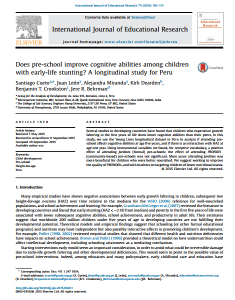Does pre-school improve cognitive abilities among children with early-life stunting? A longitudinal study for Peru
| Year | : | 2015 |
|---|---|---|
| Author/s | : | Santiago Cueto, Juan Leon, Kirk Dearden, Benjamin Crookston, Jere R Behrman, Jere R. Behrman |
| Area/s | : | Education and learning, Poverty and equality |
Cueto, Santiago; Juan León, Alejandra Miranda, Kirk Dearden, Benjamin T. Crookston y Jere R. Behrman (2015). Does pre-school improve cognitive abilities among children with early-life stunting? A longitudinal study for Peru. International Journal of Educational Research, 75: 102–114.
Several studies in developing countries have found that children who experience growth faltering in the first years of life show lower cognitive abilities than their peers. In this study, we use the Young Lives longitudinal dataset in Peru to analyze if attending pre-school affects cognitive abilities at age five years, and if there is an interaction with HAZ at age one year. Using instrumental variables we found, for receptive vocabulary, a positive effect of attending Jardines (formal) pre-schools; the effect of attendingPRONOEI (community-based) pre-schools was not significant. More years attendingJardines was more beneficial for children who were better nourished. We suggest working to improve the quality of PRONOEIs, and with teachers on targeting children of lower nutritional status.
Highlights
• An examination of cognitive abilities among a Peruvian child cohort with early-life stunting.
• Attending formal pre-schools affects positively children’s receptive vocabulary.
• Attending community-based pre-schools does not affect children’s vocabulary.
• More years attending formal preschools benefits more better-nourished children.







